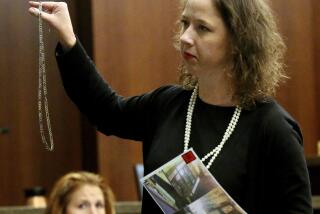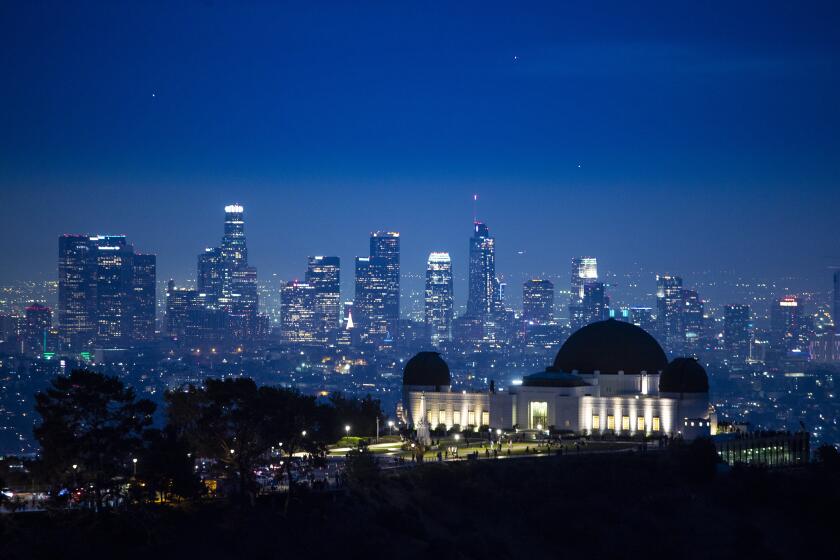Facing Huge Task, War Crimes Prosecutor Is in U.S. Seeking Help
- Share via
THE HAGUE — The burden of seeking justice in Kosovo is falling on the shoulders of a highly respected Canadian judge, who at present can send 22 investigators to the Balkans--the number of detectives working for the Beverly Hills Police Department.
Faced with a great human tragedy including detailed reports that Serbian soldiers, police and paramilitaries are carrying out a plan of mass killings, rape and destruction among Kosovo’s ethnic Albanians, the U.N. war crimes tribunal also is hobbled by other investigatory deficiencies. The technical and legal means at its direct disposal are more limited than those an American police department might use to crack a homicide.
“We are miles ahead of where we were at the beginning, but essentially we still have no independent wiretap capacity, we can’t execute a search warrant in Kosovo--we can’t even get there--we can’t call in people for questioning. I mean we could call, but they won’t come,” said Louise Arbour, chief prosecutor at the tribunal, based in The Hague.
Arbour, 52, a former judge on Ontario’s appellate court, flew to Washington on Wednesday for meetings today and Friday with Secretary of State Madeleine Albright, Defense Secretary William S. Cohen and Samuel R. “Sandy” Berger, President Clinton’s national security advisor. Her goal: American assistance in acquiring information to help bring to justice those responsible for atrocities in Kosovo, a southern province of Serbia, the dominant republic in Yugoslavia.
At a summit in Washington that ended Sunday, the United States and its 18 NATO allies pledged to transmit data about alleged war crimes in Kosovo to Arbour’s office at the International Criminal Tribunal for the Former Yugoslavia.
“As much as possible, we are asking the governments to give us material gathered by the secret services,” Arbour said during a trip to Bonn this month.
In response, Germany already has provided footage from aerial drones showing emptied villages, mass graves and Kosovo Albanians compelled to do forced labor, German Defense Minister Rudolf Scharping said.
And, in a rare breach of customary security rules, Britain last week began sharing information on more than 50 suspected war crimes, including the names of Serbian military units in the vicinity and the identities of their commanders.
“We want not just the thugs who carried out the crimes, but those who gave the orders,” British Foreign Secretary Robin Cook told a London news conference last week.
The clearest evidence of the magnitude of the atrocities, said Cook, is that more than 1 million men, women and children have been uprooted from their homes by “death squads who have burned, raped and shot their way through Kosovo.”
Arbour refuses to say whether she has sufficient information to indict Yugoslav President Slobodan Milosevic. But in a recent interview, the 5-foot-tall Montreal native insisted that she will follow the trail of responsibility as far as she can.
“It’s the goal of all our efforts, obviously, to expose criminal liability at the highest level for the most serious crimes,” Arbour said. “Now, whether it’s going to bring us to a particular person, I can’t tell you. We’re going to take it where the evidence will take us.”
The tribunal, created by a vote of the U.N. Security Council on May 25, 1993, is mandated to prosecute people responsible for war crimes and other serious violations of international humanitarian law committed on the territory of the former Yugoslav federation since 1991.
Since its creation, 84 people have been publicly indicted for offenses committed in Croatia and Bosnia-Herzegovina. Six have been found guilty. Charges were dropped against 18 others, and one defendant was acquitted. Twenty-six of the accused are in custody.
Among those still at large are former Bosnian Serb leaders Radovan Karadzic and Ratko Mladic, charged with war crimes, genocide and crimes against humanity committed in Bosnia.
On March 31, Arbour unsealed an indictment against another Serb accused of war crimes in Bosnia, Zeljko Raznjatovic, known as “Arkan.” North Atlantic Treaty Organization officials report that Arkan’s paramilitary groups are now at work in Kosovo, though Arkan has gone on television in Belgrade, the Serbian and Yugoslav capital, to deny it.
Also responsible for investigating war crimes in Rwanda, Arbour has a dozen of her 70 investigators interviewing Kosovo refugees in Albania. In Macedonia, which also has taken in large numbers of refugees from Kosovo, the number of investigators varies and may go as high as 10.
To supplement their work, Arbour’s staff members in The Hague are plowing through newspaper accounts and studying information from human rights organizations, international relief agencies and governments.
“The one thing that we have, which is powerful when it works, is that we are entitled to state assistance and cooperation,” said Arbour, who has been chief prosecutor at the tribunal since Oct. 1, 1996. That means her office doesn’t need to duplicate information-gathering efforts of governments like those of Britain, Germany and the United States.
More to Read
Sign up for Essential California
The most important California stories and recommendations in your inbox every morning.
You may occasionally receive promotional content from the Los Angeles Times.










